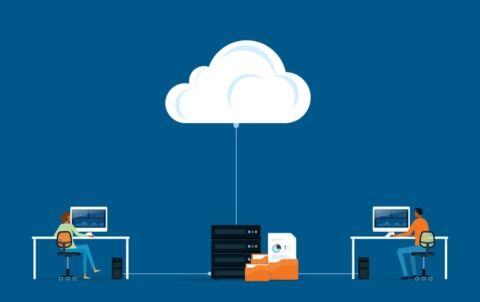The last few years have seen rapid change in the way we do business, with digital transformation and modern collaboration solutions streamlining productivity and maximizing performance. Despite adopting the cloud in many facets of their organizations, some enterprises are resistant to migrate from on-prem to modern backup solutions, such as Backup as a Service (BaaS).
Backup as a Service, or cloud backup, is a data protection method where data is stored in the cloud, eliminating the need for infrastructure or storage space, and managed by a BaaS vendor, who provides the software and support services.
Some of this hesitation comes from misconceptions about what BaaS is. In this post, we’ll be dispelling some of the key misunderstandings about cloud backup and how Backup as a Service is a critical piece of any company’s resilience strategy.
Myth #1: Backup as a Service isn’t as secure as traditional data center backup.
Those accustomed to enterprise data center backup and recovery solutions might be uncomfortable with the risk cloud-based storage introduces. This is not unfounded, as the rise in cyberattacks such as ransomware, which has seen a 300% increase in attacks since 2020, has captured headlines over the last year.
What many enterprises don’t know is that many BaaS vendors offer protection against ransomware through features such as ransomware detection or recovery, which scan your backups for malware and offer disaster recovery capabilities.

For example, products like AvePoint Cloud Backup can provide early warning signals through detection of anomalies and encryption. Cloud Backup also provides reporting that allows administrators to determine impacted scopes, which could greatly help to shorten investigation and restore time.
After an investigation has been performed, you can move into a remediation phase to restore from your last good backup. Cloud Backup provides easy-to-follow guidance with suggestions about the best time range from which to restore, which helps with faster and precise recovery from backup data.
Myth #2: Cloud backup providers can’t backup all my environments.
Today, most organizations are using multiple SaaS applications in your day-to-day. If your enterprise utilizes multiple workspaces, such as Microsoft 365, Salesforce, or Google Workspace, you need to ensure each workspace is protected without compounding your solution stack.
In fact, this was a key recommendation in the 2022 Gartner® Market Guide for Backup as a Service, which provides an overview of the BaaS landscape as well as recommendations for enterprises shopping for a BaaS vendor. The report recommends you evaluate SaaS backup vendors based on their support of your mission-critical applications, like Microsoft 365 or Salesforce.

While some BaaS providers specialize in one workspace, others offer sweeping coverage of your workspaces. BaaS specialists like AvePoint – recently named a Leader in The Forrester New Wave: SaaS Application Data Protection – offer multi-cloud backup, with capabilities for Microsoft 365, Google Workspace, Salesforce (CRM), Dynamics 365, and now Microsoft Azure, which includes Virtual Machines (VMs), Active Directory (AD), and Storage.
Myth #3: It is impossible to meet data privacy regulations when storing data on the cloud.
One key concern some organizations have with data protection in the cloud is data sovereignty. In other words, “where is my data physically stored?” This is a result of regulations like GDRP that dictate conditions like the geographical locations where data can be stored.
Thanks to the hefty fees often associated with being non-compliant, it’s understandable that meeting data residency regulations is top of mind for many organizations. Fortunately, many BaaS providers will not only have data centers in each location you need to backup and store data, but also have expertise on additional requirements of data residency or even privacy regulations, like right to be forgotten and purge features.
For example, AvePoint Cloud Backup enables data availability for data subject requests and appropriately archives and backs up data on a scheduled basis. With Multi-Geo support and data centers worldwide, backup data can be stored, retained, processed, security trimmed, and managed entirely in-country and in your own storage, guaranteeing data security and sovereignty.
AvePoint is committed to the privacy and security of our customers and yours – discover how we can help your customers meet regulations and stay compliant by visiting our Trust Center.

Final Thoughts
While the BaaS is still an evolving landscape, it is the way of the future. It can be intimidating to take the leap and fully adopt the cloud, but data protection has never been easier to manage or control than with BaaS. Cloud backup is more cost-effective with faster recoveries and less physical storage space needed than tradition on-prem backup.
If you have already made the choice to use other SaaS services like Salesforce, Google Workspace, or Microsoft 365, it’s time to consider adopting cloud-based backup. After all, the best approach to protect cloud data is cloud backup.
Learn more about the changing landscape of Backup-as-a-Service in the 2022 Gartner Market Guide for Backup as a Service.
Disclaimers: Gartner does not endorse any vendor, product or service depicted in its research publications and does not advise technology users to select only those vendors with the highest ratings or other designation. Gartner research publications consist of the opinions of Gartner’s research organization and should not be construed as statements of fact. Gartner disclaims all warranties, expressed or implied, with respect to this research, including any warranties of merchantability or fitness for a particular purpose.
GARTNER is a registered trademark and service mark of Gartner, Inc. and/or its affiliates in the U.S. and internationally and is used herein with permission. All rights reserved.




